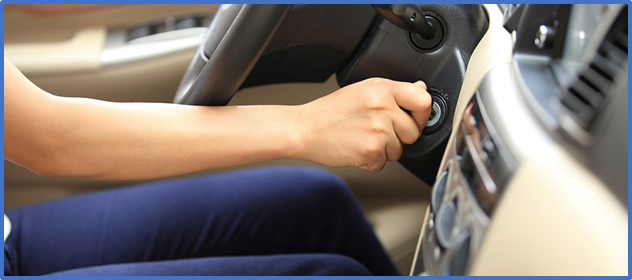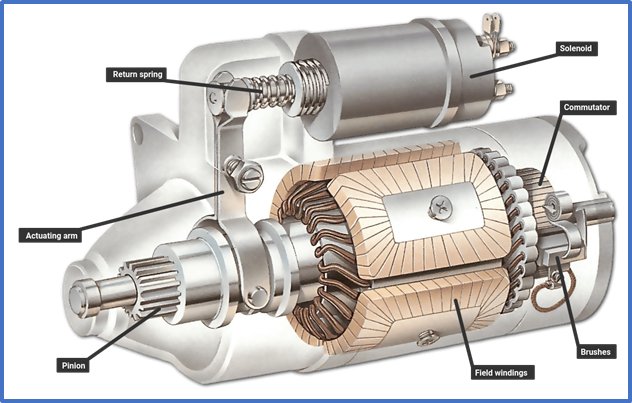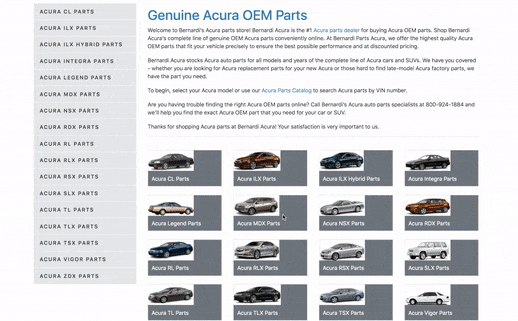
When a car won’t start, most people are quick to assume it’s a problem with their battery. And, while a dead battery certainly could be the issue, it’s not always the case.
In fact, issues with starters are more common than you think. Here are some symptoms to look for tips to help you determine whether the problem is with your Acura’s battery or starter.

What is a Starter Motor?
Before you can dig into what might be wrong with your vehicle’s starter, first you need to know exactly what a starter is and what it does.
The starter is a small, powerful, electric motor. It is used to rotate, or “crank”, your main engine in order to get it to start your vehicle.
When you turn the key to your vehicle (or push the “Start” or ignition button, in certain newer makes and models), the battery sends power to your starter’s solenoid. As that current surges through your starter, a small gear called a pinion extends out to mesh with the teeth on the flywheel of the main engine in order to turn the crankshaft.
That’s is how your starter, powered by your battery, is supposed to start your vehicle’s engine. If your car won’t start, however, here are some common symptoms and their causes. Once you identify the cause, a Bernardi Parts Acura expert can help you pick all the parts you need to get back out on the road.
Symptoms of a Bad Starter
Now that you know what a starter is and how it works, it’ll be easier to figure out where the problem lies. These are the most common symptoms or expressions of a faulty starter motor:
Grinding Noises
One of the more alarming symptoms on the list, grinding noises when you’re trying to start your car typically come from either normal wear on the pinion gear, or from the pinion failing to correctly mesh with your engine’s flywheel. Not only is this a giveaway that your starter is failing, it’s a fairly urgent warning sign that you should get it replaced quickly, before you damage your flywheel, which will mean a much more expensive repair bill.
Only the Lights Turn On
Another common sign of a bad starter is if the lights on your vehicle’s dashboard go on but the engine doesn’t start. This scenario usually is accompanied by a dead “clicking” sound when you try to start the engine.
Freewheeling
Typified by a loud, whining noise, freewheeling occurs when the pinion rotates without engaging the engine’s flywheel. Identifying the cause can be tricky, and might be best addressed by replacing your starter.
Smoke
Your starter is powered by your vehicle’s battery. If there is a blown fuse, or a short in the wiring, or even if you just try cranking the starter for too long, your starter will begin to overheat and might start to smoke; the smoking might, no surprise, also be accompanied by a burning smell. If this occurs, it’s important that you stop trying to start your vehicle and get your vehicle serviced as soon as possible. Depending on the circumstances, it also might be wise to call for a tow.
Nothing
Turning the key and having nothing happen is a different kind of symptom, and one that is easy to trace back to your starter. If you try to start your car and nothing happens—no grinding, no whining, no smoke—your starter probably has a bad solenoid. Since solenoids are what transmit power from the battery to the starter, a faulty solenoid can easily be misdiagnosed as a faulty starter, entirely.
Replacing your Bad Starter
If the information above helped you to identify a bad starter in your Acura, the next step is to replace it before it causes any cascading damage to other engine parts.
Finding the right part for your Acura couldn’t be easier. Simply click here to open a new tab and follow along with the video below to select your year, model, and trim package. Once you’ve selected your vehicle, you’ll can find starter motors and related parts in the Engine section.

When you shop for OEM Acura parts with Bernardi Parts, you’ll find everything you need, at competitive prices and with free shipping on most orders $75 or more.
For more information on this or any other genuine Acura parts or accessories, please send us a message, or give us a call at 800-924-1884.